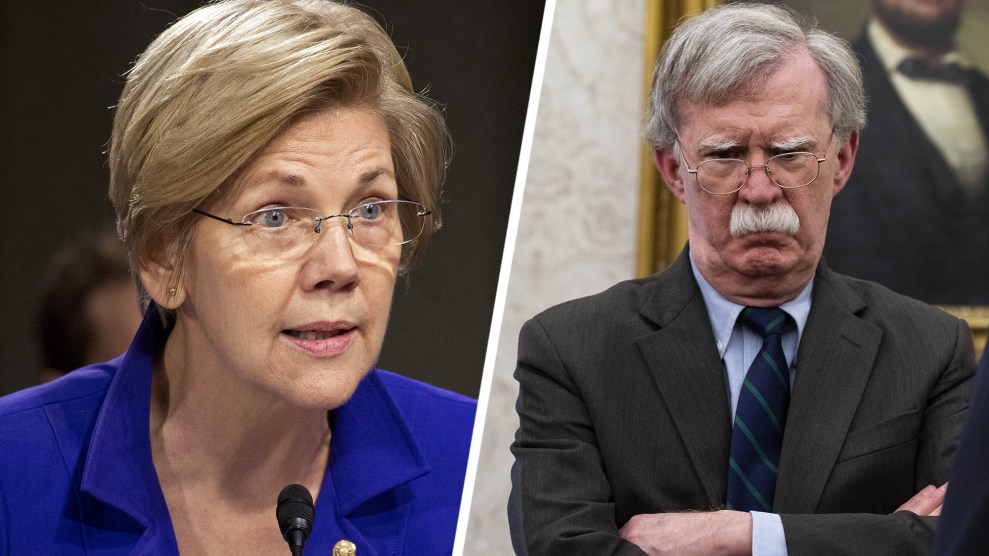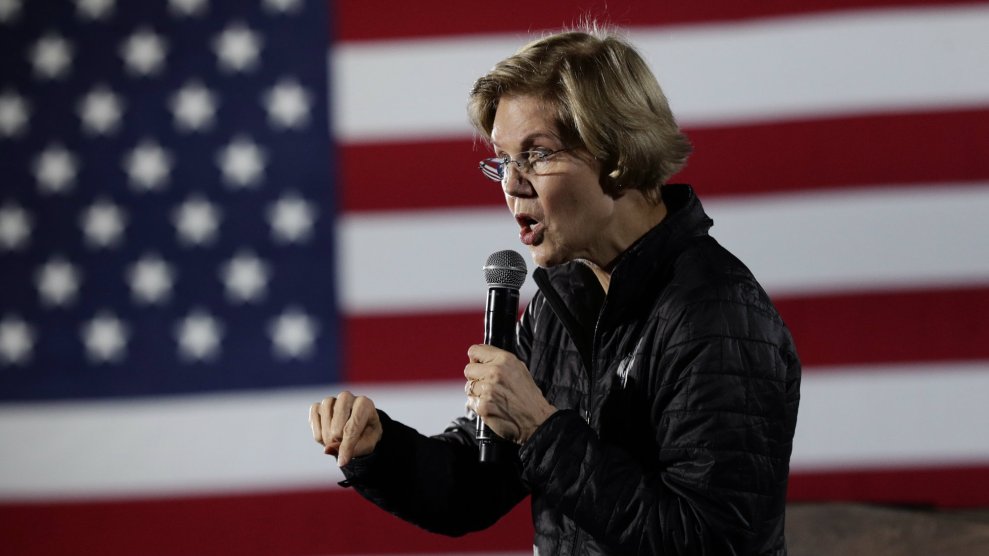Mother Jones illustration; SMG/Zuma, Bill Clark/Zuma
Before Elizabeth Warren was a senator from Massachusetts and a Democratic presidential candidate, she ran the Congressional Oversight Panel that was in charge of overseeing the $700 billion Troubled Asset Relief Program (TARP) bailout that Congress approved after Wall Street crashed in 2008. In that capacity, Warren, then a Harvard law professor, kept a close watch on where the money was going and crafted public reports that disclosed that the Treasury Department had overpaid $78 billion for assets it bought from failed banks and that large chunks of the money were not being used well. Last month, Congress passed a $2 trillion coronavirus bailout and assistance bill, and it contains a $500 billion fund—Representative Katie Porter (D-Calif.) calls it a “slush fund”—from which the Trump administration, at its sole discretion, can dole out money to big corporations in distress. What’s the best way to monitor this flow of billions? Warren, no surprise, has some ideas. So Mother Jones asked her for tips on the sort of oversight that must be done to ensure taxpayers and workers are not ripped off in this process.
Zooming from the back porch of her Massachusetts home, with her dog Bailey at her feet, Warren, ever the professor, first wants to lay out the fundamentals. The Coronavirus Aid, Relief, and Economic Security (CARES) Act, she notes, has four overall parts: sending money to hospitals and other health care facilities, expanding unemployment benefits, providing assistance to small businesses, and establishing what she agrees is a $500 billion “slush fund” for large corporations. (There is also money in the bill for education, food security, and state and local government responses to the crisis.) She frets Donald Trump and his administration will use this money to “reward their political friends and punish their political enemies.” And she points out, “I spent a lot of time in the negotiations [over the bill]…to try to get at least some curbs on how the money is spent and some oversight. I just got to tell you, we improved it. We got a little bit more oversight than the original version of the bill. But not nearly enough. And Republicans basically said this is going to be the price of getting money to our medical providers, getting money to people who are unemployed, getting money to small business: ‘You guys are going to have to go along…with this slush fund for giant corporations.'”
Listen to David Corn’s in-depth interview with Sen. Elizabeth Warren on this week’s edition of the Mother Jones Podcast.
The oversight provisions in the measure do include a special inspector general for pandemic recovery, who will track all loans and expenditures made from the $500 billion fund, and a congressional oversight commission, similar to the one Warren ran years ago, which will monitor this spending and evaluate its impact. But Warren points out the commission will only be as strong as its members, who have yet to be appointed: “What kind of people are they? Are they really going to be in there and driving for oversight? Or are they going to be folks who check off the box and let it go.” (On Thursday, House Speaker Nancy Pelosi announced she was setting up a separate select committee of House members to oversee the Trump administration’s response to the coronavirus crisis and its management of the $2 trillion assistance and rescue measure.)
In her day as the cop on the bailout beat, Warren generally had the support of a Democratic Congress and the Obama administration. That won’t be the case this time around, she observes. Trump has already declared he has the right to block the new special IG from sharing information with Congress and the public. And the CARES Act contains no provisions that allow any outside review of expenditures or loans before Treasury Secretary Steven Mnuchin okays them. Whatever he (or Trump) decides, goes.
In this environment—with a president hostile to transparency and accountability—what can be done to cast sunlight onto Mnuchin handing out $500 billion in taxpayer dollars to big companies?
“Here are the top things,” Warren says. First, she notes, “be consistent in talking about this every single day. We can’t let this just drop off the radar screen. Remind people the slush fund exists.” Her second tip is “dig into individual pieces.” She reports, “I’m doing this with my Senate staff. We’ve already set up a team to go after it every single day…to tease out what information we can.” And her third tip is to shout about any bad examples that turn up: “When particularly bad stories arise, we have to be willing to elevate them. Point out this is taxpayer money, money that could have been used for personal protective equipment or health care professionals…money that could have been used to help small business…to help people who are unemployed.”
Doing all this, Warren asserts, is “the best way to influence how the money gets spent.” She and other senators tried to insert a provision into the bill that would require Mnuchin to provide information about each handout from this fund in advance. But Republicans and the White House opposed that. “And you better believe the Trump administration is not going to give us that information going forward,” Warren says. The law requires only that information about expenditures from this immense fund be provided to Congress within seven days and made public within two weeks. And there is virtually no way to undo a misguided, inefficient, or corrupt use of these funds. “The curbs are so minor and there’s so much discretion that’s been lodged with Donald Trump’s own secretary of the Treasury, who is big fundraiser for Donald Trump,” Warren remarks. “And that’s going to be a real problem.”
With no clawbacks allowed, Warren says, the only recourse is “you jump on every piece of information that comes out because that influences the next decision that gets made.” The only restraint is “public opinion. We’ve seen for a long time they don’t seem to care about public opinion. And yet they do, if you get enough pressure.”
Warren’s tips essentially boil down to this: pay attention, pay attention, pay attention “We’re going to have to do a kind of crowdsourcing oversight,” she says. Noting that the $500 billion could be used by its corporate recipients to leverage up to $4 trillion in financing, she adds: “It’s so much money at stake. This really affects our economy. If these companies are not able to pay it back or not able to pay it back for a very long time, that’s money we could’ve spent elsewhere.” If the money is not used appropriately and well, she insists, that will “undermine the very foundation of our democracy.”
In recent days, Warren has tried to lay down markers with Mnuchin. She sent him one letter demanding, as the law permits, that he use this fund to help state and local governments deal with the severe budget shortfalls they are facing because of the coronavirus crisis before he bails out large companies. (Many states and localities may be forced to cut services—and dismiss workers—because of the budgetary demands caused by the crisis.) And she sent another letter to Mnuchin and Federal Reserve Chairman Jay Powell requesting they set up guidelines to guarantee bailout funds are used to protect workers and not reward corporate misbehavior and that they establish strong anti-corruption and transparency rules. Warren, of course, provided them detailed lists of proposed guidelines and rules.
“I will be watching carefully,” she told Mnuchin and Powell, “as you hand out these funds.”
Watch the full interview with Sen. Elizabeth Warren:
















